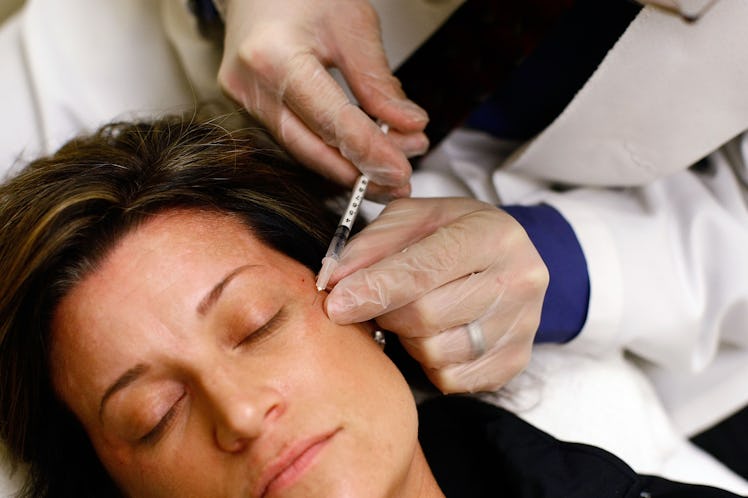
Botox Is Being Studied As A Depression Treatment & It Actually Makes So Much Sense
Botox can do some pretty magical things, like reduce the appearance of fine lines, stop excessive sweating, and help ease migraines — but can Botox treat depression? Whispers of such things have been circulating around the beauty community as of late, and, TBH, it seems a little too good to be true. Being the beauty Nancy Drew that I am, I enlisted the help of Aesthetic Plastic Surgeon, Z. Paul Lorenc, MD, FACS to help us uncover the truth.
If you've ever stayed up late binge watching episode after episode of The Real Housewives of [insert city here], then you're aware of the wonder that is Botox. This injectable is most well known for its line softening effects, which is why it's become the filler of choice for reality stars (and other famous celebs who have their faces magnified on our film, television, computer, and phone screens daily). Botox is basically the fountain of youth...in a needle. A little pinch here and a little dab there and, suddenly, you can diminish signs of wear and tear, work stress, and overall life strife.
However, I must admit that at the ripe old age of 26, my knowledge on the subject exclusively comes from my Bravo addiction. I know very little about the actual procedure and what it can actually do for you. I gathered that Botox helps to reduce the appearance of fine lines and wrinkles, but alleviating depression? That's where Aesthetic Plastic Surgeon, Z. Paul Lorenc, MD, FACS comes in. If Botox actually has the power to make me feel happier, only an actual doctor would be able to explain how.
According to Dr. Lorenc, in the United States, Botox is officially approved for three main aesthetic purposes: glabellar lines (the short, vertical lines between the eyebrows commonly referred to as the 11s), lateral canthal lines (the lines around the eyes often referred to as crow's feet) and forehead lines (these are more self explanatory). In addition to turning back time better than Cher, Botox is also approved for to treat various medical conditions, like migraine headaches, muscle dystonia (uncontrollable contracting of the muscles), urinary bladder incontinence (uncontrollable bladder), strabismus (misalignment of the eyes) and hyperhidrosis (excessive sweating).
So Botox is, in fact, not just for aesthetic purposes. The injection does indeed treat physical ailments, but can it help to alleviate internal, emotional conditions as well?
Dr. Lorenc says it just might.
According to Dr. Kruger from Hamburg, our emotions are expressed by facial muscles, which in turn send feedback signals to the brain to reinforce those emotions, like depression. Treating facial muscles with botulinum toxin [aka Botox] interrupts this cycle so a patient who does not look depressed feels less depressed. This is known as the “facial feedback” hypothesis. In his study, there was a 47 percent improvement in the level of depression with one Botox treatment."
You know those glabellar lines (aka 11s) that I mentioned before — they may be part of the problem. Think about the face you make instinctively when you're angry: your forehead furrows and those little lines between your brows appear. Well, if they stay long after the anger has past, you might still look forlorn, which can cause you to feel forlorn once again if you catch an accidental glimpse of yourself in a passing reflection.
This phenomenon is nothing new, either. The correlation between the glabellar lines and depression dates way back to the Victorian era. Dr. Lorenc says that glabellar lines were once referred to as “the omega sign of depression” (the omega symbol looks like the number 11, btw). Way before Botox was even a thing, people noticed that if they looked depressed with a permanently furrowed brow, they'd start to feel depressed as well.
Let's be real, I can relate. On the days when I wake up, look into the mirror, and feel like I look my worst, my emotions begin to match. When I look haggard, I feel haggard. '
TBH, a 47 percent positive result in a carefully executed medical case study in Botox for depression is certainly worth a shot to me. I was doubtful at first, but I'm a science gal at heart. Data and cold hard facts will always win me over.
If you're over 18 years old, you're more than welcome give it a try, though it might cost you a pretty penny. According to Dr. Lorenc, "The standard dose for this is 25 units. Depending on the region of the country you're in, this translates to $500-$750." Sometimes Botox is covered by insurance in physical medical cases, but because treating depression is an off-label use of the product, insurance doesn't cover it right now.
I feel the same way about Botox as I do all things cosmetic and beauty. If it makes you feel good, do it! And if you're going to get Botox for aesthetic purposes anyways, a little burst of emotional relief might be a much welcomed side effect.